Mary Guenther is the head of space policy at the Progressive Policy Institute.
From President John F. Kennedy’s iconic call to “go to the Moon, not because it is easy” to President Barack Obama’s forward-looking directive to use commercial rides to orbit for cargo and crew, Democrats have historically been strong supporters of the space program.
Unfortunately, in the years since Obama left office, Democrats have dropped the ball on the matter. Republicans have used it to rile up their base with calls to showcase American superiority, and beat China on the off-world stage.
It’s not that Democratic members are silent on space. We still see lawmakers on the left celebrating major milestones in the space program, and vocally supporting the traditionally Democratic positions of promoting science funding and workforce development.
These are important things to support. But they’re a small subset of space-related topics that require attention as the space industry rapidly transforms.
Lopsided interest: A quick glance at space-related bills introduced last Congress tells a clear story: Democrats led space legislation 30% less often than Republicans, and Democrats aren’t engaging on the breadth of topics Republicans have laid out proposals for.
That lack of action is driving an innovative, tech-focused population away from the Democratic Party. At the New Directions for Democrats summit in late April, Rep. George Whitesides (D-CA) remarked that he had been told many startups haven’t heard pro-innovation messages from Democrats for some time. As a result, many tech bros and defense startups—space-related businesses and executives included—are backing Republicans.
In an op-ed in The Hill, economist Alexander Salter put it simply when he said, “the parties do not have equally impressive recent records on space policy—Republicans have accomplished much more.” Salter cited accomplishments from Trump’s first term—including more than half a dozen directives ranging from space traffic management, to establishing the Space Force.
Money matters: So, why should Democrats who aren’t space nerds like Whitesides and me care? With the cost of eggs soaring to the Kármán Line, why should people care about the Moon?
Polls show that American voters view Democrats generally as weaker on the economy. The economy was a major contributor to the walloping loss for the party during the last election. Condemnation of Trump’s economic chaos isn’t enough—voters want to see Democrats present their own economic agenda.
The space industry provides a fantastic opening to talk about what that agenda can and should look like.
A pro-economy space policy: Trump’s tariffs, and broader efforts to try to bring manufacturing back to the US by raising the prices Americans pay on everyday goods, are not the answer.
Promoting innovation and American leadership in growing industries of the future, on the other hand, are practical and pro-growth policies that will create American jobs instead of leading to layoffs across the country.
The space industry demand is expanding rapidly within the United States. The need for American workers in this high-tech industry has never been higher, as export controls applied to the industry necessitate American manufacturing for many products.
- According to analysis from the Space Foundation, “in the last decade, overall private sector employment increased 14.3%, while space sector employment increased 27%”—and it shows no signs of slowing down.
- These are disproportionately high-paying jobs at all educational levels. The space industry needs welders just as much as it needs engineers and rocket scientists.
- In 2023, the average salary in the space industry was nearly double the average private sector salary, the Space Foundation says.
We know that the American people are eager for economic opportunity and change. Yet, visit any aerospace supplier around the nation and you’ll hear a different story. Aerospace businesses and workers are proud to support American space leadership—and to work a job that enables them to support their families.
A path forward: Democrats need to strongly support the space industry, because it creates those jobs. That support means enacting reasonable regulatory reform, promoting a tax policy that incentivizes research and development, and standing up for agencies like NASA and services like the Space Force that are critical to the industry.
Policy is vital to the continued success of the American space industry, but policy alone isn’t enough. That policy needs to be matched with messaging that helps Americans understand the benefits of space for their community—and how space fits into the broader economic offering that Democrats want to provide when the party regains power.
Supporting the space economy should be a messaging slam dunk for Democrats, going into 2026 and beyond. Space creates great jobs, grows the economy, inspires students to pursue STEM, keeps the country safe, and helps us understand climate change.
As Trump’s administration repeatedly takes actions that make the rich richer and that do nothing for normal Americans who want to work their way up the economic ladder, there’s a real opportunity for Democrats to regain voters via pro economic growth policies.
Space should be a poster child for that effort. The party needs to get to work now to make that a reality, rather than running from a policy arena Republicans are currently dominating.





